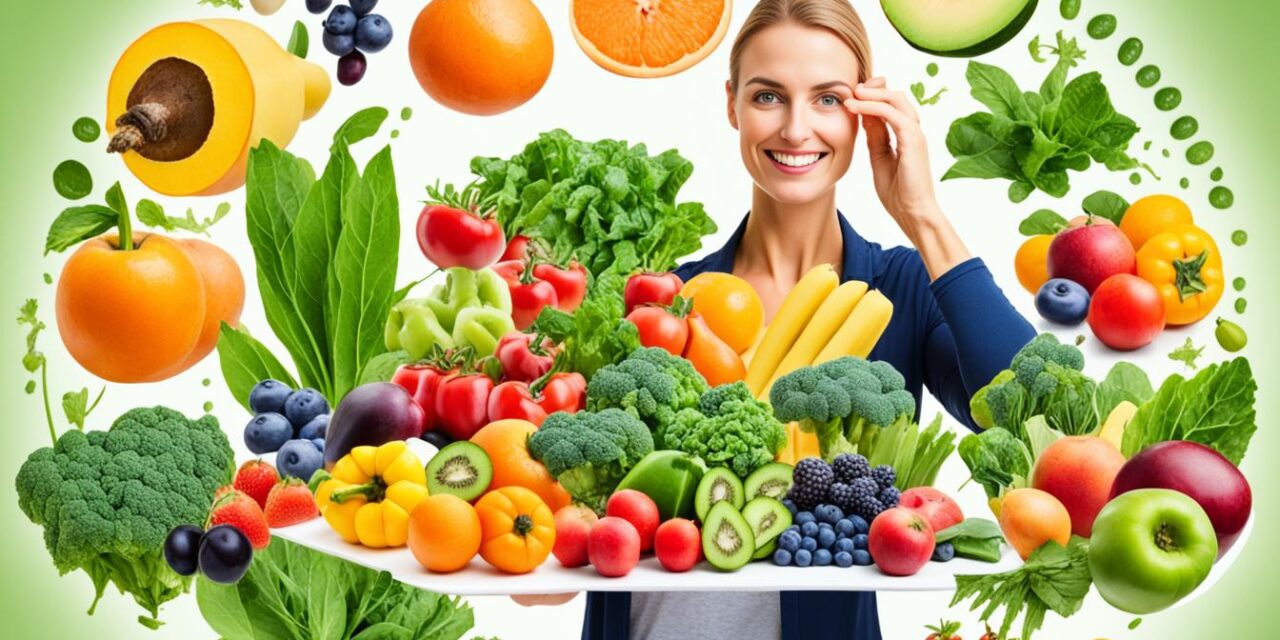Did you know that a wide variety of plant-based, whole foods can provide all the necessary nutrients for a vegan diet? Contrary to popular belief, vegan nutrition is not lacking in essential elements. In fact, research suggests that vegan diets can be one of the healthiest ways to eat, as they can provide sufficient protein, fiber, vitamins, and minerals.
Key Takeaways:
- A well-planned vegan diet can provide all the necessary nutrients for optimal health.
- Plant-based diets can be one of the healthiest ways to eat, as they provide sufficient protein, fiber, vitamins, and minerals.
- Fortified foods and supplements can help vegans meet their nutrient needs, especially for nutrients that may be challenging to obtain solely from plant-based sources.
- Vegans should focus on consuming a variety of nutrient-rich plant foods, such as fruits, vegetables, legumes, whole grains, nuts, and seeds.
- Veganism not only benefits personal health but also contributes to environmental conservation and animal welfare.
Debunking Misconceptions: Plant-Based Diets Throughout History
When it comes to veganism and plant-based diets, some people may view them as trendy, modern concepts. However, the truth is that these dietary choices have roots that stretch back centuries. While the word “vegan” may have been coined in the 1940s, ancient societies were already embracing plant-based eating long before then.
In ancient Indian culture, vegetarianism was prevalent, with a strong emphasis on abstaining from animal products. The practice of vegetarianism was deeply rooted in religious and philosophical beliefs, such as non-violence and compassion for all living beings.
In the Mediterranean region, particularly in ancient Egypt and Greece, plant-based diets were also common. Historical evidence suggests that people intentionally avoided consuming animal products as far back as 2,000 years ago. Their primary motivations may have varied, including ethical, environmental, and health-related considerations.
This rich history of plant-based eating shows that veganism is not just a passing trend but has been a part of diverse cultures throughout time.
“We often think of veganism as a modern phenomenon, but the truth is that it has ancient roots. People centuries ago recognized the benefits of plant-based diets for their health, the environment, and ethics. It’s fascinating to see how these ideas have stood the test of time.”
Ancient Vegan Diets in Different Cultures
Let’s take a closer look at the ancient vegan diets in different cultures:
| Culture | Key Features |
|---|---|
| Indian | Vegetarianism based on religious and philosophical beliefs, emphasizing compassion for all living beings |
| Mediterranean | Avoidance of animal products for ethical, environmental, and health reasons |
“These ancient cultures recognized the benefits of plant-based eating, whether it was for spiritual, ethical, or practical reasons. Their knowledge and wisdom continue to inspire the vegan movement today.”
Despite the misconceptions that veganism is a modern phenomenon, history reveals that plant-based diets have been practiced for centuries. Today, we can draw inspiration from the ancient wisdom and incorporate it into our own lives, embracing the benefits that come with a plant-based lifestyle.
The Health Benefits of a Whole Food, Plant-Based Diet
Are you ready to discover the incredible health benefits of a whole food, plant-based diet? Buckle up, because your well-being is about to skyrocket!
Research has shown that embracing a whole food, plant-based diet can work wonders for your heart health. By nourishing your body with nutrient-rich plant foods, you can lower your risk of heart disease and enjoy a vibrant, thriving ticker.
But that’s not all! A plant-based diet also has the potential to prevent various types of cancers, including breast, colorectal, and prostate cancer. By filling your plate with colorful fruits, vegetables, legumes, and whole grains, you’re giving your body powerful ammunition to fight against cancer cells.
Did you know that what you eat can impact your mental well-being? It’s true! Adopting a plant-based diet has been linked to a reduced risk of mental health issues like depression, stress, and post-traumatic stress disorder. So not only will you be nourishing your body, but you’ll also be supporting your mind.
And here’s another headline-worthy benefit: a whole food, plant-based diet can help prevent type 2 diabetes. By prioritizing whole grains, legumes, and leafy greens, you can keep your blood sugar levels stable and decrease your risk of developing this chronic condition.
Are you still not convinced? Take a look at this information-packed table that highlights the incredible health benefits of a whole food, plant-based diet:
| Benefit | Description |
|---|---|
| Heart Health | A plant-based diet supports cardiovascular wellness and reduces the risk of heart disease. |
| Cancer Prevention | Eating plant-based foods can lower the risk of various types of cancers, including breast, colorectal, and prostate cancer. |
| Mental Health | A plant-based diet is associated with a reduced risk of mental health issues like depression, stress, and post-traumatic stress disorder. |
| Type 2 Diabetes Prevention | By following a plant-based diet, you can decrease your risk of developing type 2 diabetes. |
Now that you know about these incredible health benefits, isn’t it time you start embracing a whole food, plant-based diet? Your body and mind will thank you!
Veganism and Environmental Impact
When it comes to the environmental impact, animal agriculture takes center stage. The production of beef, in particular, has a significant role in deforestation, with the Amazon rainforest being heavily affected. But that’s not all; soy production is also closely associated with deforestation. However, it is worth mentioning that the majority of soy is used as animal feed rather than direct human consumption. This emphasizes the interconnectedness between animal agriculture and deforestation.
“Animal agriculture is responsible for a significant portion of global emissions, even surpassing the aviation industry.”
To put it into perspective, research indicates that animal agriculture contributes more to global emissions than the aviation industry does. This startling fact highlights the urgent need for sustainable choices in our dietary habits. Both conventional and grass-fed beef farming are major contributors to greenhouse gas release and land use changes that further exacerbate environmental issues.
So, what can you do to make a positive impact? By embracing a vegan lifestyle, you contribute directly to combating deforestation, reducing emissions, and promoting sustainability. Making sustainable choices is not just beneficial for the environment; it also aligns with your health and values. Choosing plant-based alternatives allows you to create a significant ripple effect towards a more sustainable future.
Sustainable Choices for a Greener Future
Looking for ways to make sustainable choices in your everyday life? Here are some actionable steps you can take:
- Opt for plant-based alternatives to meat and dairy products
- Reduce your consumption of animal products
- Choose locally sourced and organic produce
- Support brands and businesses that prioritize sustainability
- Minimize food waste by planning meals and composting
- Advocate for sustainable practices in your community and beyond
By adopting these sustainable choices, you actively contribute to mitigating the environmental impact of animal agriculture. Making conscious decisions today will pave the way for a greener and more sustainable future for generations to come.
The Importance of Nutrient-Dense Plant Foods
A key aspect of a vegan diet is consuming nutrient-dense plant foods. By focusing on fruits and vegetables, beans and soy foods, whole grains, nuts and seeds, vegans can ensure they are meeting their nutrient needs and maintaining a balanced diet.
Fruits and Vegetables
Fruits and vegetables are not only packed with flavors but also rich in essential vitamins and minerals. They provide the body with antioxidants, fiber, and a wide range of nutrients necessary for optimal health. Incorporating a variety of colorful fruits and vegetables into your meals can help strengthen your immune system and enhance overall well-being.
Beans and Soy Foods
Beans and soy foods are excellent sources of protein, fiber, potassium, and iron. These plant-based options are not only nutritious but also versatile in culinary applications. From black beans and chickpeas to tofu and tempeh, there are plenty of delicious ways to incorporate beans and soy foods into your vegan diet.
Whole Grains
Whole grains like brown rice and quinoa contribute fiber, iron, and zinc to your diet. They provide sustained energy and can be a satisfying addition to any meal. Whole grains are also known to promote digestive health and support healthy weight management.
Nuts and Seeds
Nuts and seeds offer a range of health benefits. They are high in healthy fats, fiber, minerals, and zinc. Snacking on almonds, walnuts, chia seeds, or flaxseeds can provide essential nutrients and promote heart health.
By incorporating these nutrient-dense plant foods into your meals, you can ensure you’re getting a wide range of essential vitamins, minerals, and other necessary nutrients for your vegan diet.
Eating for Optimal Health on a Vegan Diet
Beyond meeting nutrient needs, it’s important to consider overall health when following a vegan diet. Here are some key factors to focus on:
- Increasing Fiber Intake: Fiber is crucial for a healthy digestive system and can be easily achieved by incorporating more whole plant foods into your diet. Opt for whole grains, legumes, fruits, and vegetables to boost your fiber intake.
- Reducing Saturated Fat: Consuming high levels of saturated fat can increase the risk of heart disease. As a vegan, you have a natural advantage as animal products are a primary source of saturated fat. However, be cautious of processed foods that contain palm oil and coconut oil, as they are high in saturated fat.
- Embracing Nutty Goodness: Nuts are not only a great source of protein but also provide heart-healthy fats. Adding a handful of nuts to your meals or snacks can contribute to overall well-being.
- Making Fruits and Vegetables the Star: Fruits and vegetables are rich in essential vitamins, minerals, and antioxidants. Aim to make them the mainstay of your meals and snacks to maximize their health benefits.
- Monitoring Sodium Intake: Processed and canned foods often contain high levels of sodium. Pay attention to nutrition labels and limit your consumption of these products to maintain optimal health.
- Practicing Alcohol Moderation: While moderate alcohol consumption may have certain health benefits, excessive alcohol intake can be detrimental to your well-being. Enjoy alcohol in moderation and make responsible choices.
By considering these factors, you can ensure that your vegan diet promotes optimal health and well-being.
Remember, a high-fiber intake is essential for a healthy digestive system and overall well-being.
Meeting Nutrient Needs on a Vegan Diet
While embracing a vegan diet can provide most nutrients needed for optimal health, it’s essential to consider specific factors to ensure adequate intake. By incorporating a wide variety of nutrient-rich plant foods into your meals, you can meet the body’s requirements for protein, iron, zinc, vitamin A, and omega-3 fats.
Protein Sources
Protein is an essential macronutrient that supports various bodily functions. Thankfully, plant-based sources can provide ample protein to sustain your needs. Incorporate legumes like beans and soy foods, such as tofu, tempeh, and edamame, into your diet. These protein-packed options will satisfy your taste buds and keep you energized throughout the day.
Iron-Rich Foods
Iron plays a critical role in oxygen transport and energy production. You can obtain iron from plant sources, including beans, lentils, fortified grains, and leafy green vegetables like spinach and kale. To enhance iron absorption, pair these foods with vitamin C-rich options, such as citrus fruits, strawberries, or bell peppers. This dynamic duo will maximize the nutritional benefits of your meals.
Zinc-Boosting Ingredients
Zinc is essential for immune function and cell growth. Boost your zinc intake with whole grains, legumes, nuts, and seeds. Explore preparations like soaking, sprouting, or fermenting to enhance zinc absorption. Get creative by incorporating ingredients like quinoa, hemp seeds, and pumpkin seeds into your meals for a delightful twist on flavor and nutrition.
Vitamin A from Plant-based Sources
Vitamin A contributes to eye health, immune function, and cell growth. While it’s often associated with animal products, you can obtain its precursor, beta-carotene, from deep orange vegetables like carrots and sweet potatoes. Additionally, dark leafy greens such as spinach and kale are excellent plant-based sources of vitamin A. To enhance absorption, pair these foods with a source of healthy fat, such as avocado or olive oil.
Omega-3 Fats from Ground Flaxseed
Omega-3 fats support heart health and brain function. Ground flaxseed is an excellent plant-based source of omega-3 fatty acids. Add a tablespoon of ground flaxseed to your morning smoothie, oatmeal, or sprinkle it on top of your favorite plant-based yogurt. This simple addition will provide you with a natural boost of omega-3 fats to support overall well-being.
By following these recommendations and maintaining a varied and balanced vegan diet, you can meet your nutrient needs without compromising on taste or experience. Embrace the abundance of plant-based options and nourish your body with the goodness nature has to offer.
Conclusion
So, you’re curious if you can get all your nutrients from plants? Well, let me break it down for you. A well-planned vegan diet can actually provide you with all the necessary nutrients for optimal health. Yes, you heard that right! By embracing a diverse range of plant-based whole foods like fruits, vegetables, legumes, whole grains, nuts, and seeds, you can fulfill your protein, vitamin, mineral, and healthy fat requirements.
Now, I won’t lie to you, there are a couple of nutrients that need some extra attention. Vitamin B12 and vitamin D, for example, may require supplementation or fortified foods. But don’t worry, there are plenty of vegan-friendly options available to make sure you’re covered.
Not only does a plant-based diet benefit your personal health, but it also has a positive impact on the environment and animal welfare. By choosing veganism, you contribute to environmental conservation and take a stand against animal cruelty. So, not only are you nourishing your body, but you’re also making a difference in the world.
In conclusion, don’t let anyone tell you that a vegan diet is lacking in nutrients. With a little bit of planning and a wide range of nutrient-rich plant foods, you can thrive on a vegan lifestyle. So go ahead and fuel your body with the goodness of plants!
FAQ
Can you get all your nutrients from plants?
Do vegan diets have a long history?
What are the health benefits of a whole food, plant-based diet?
How does animal agriculture impact the environment?
What are some nutrient-dense plant foods?
How can you eat for optimal health on a vegan diet?
How can you meet nutrient needs on a vegan diet?
MORE SOURCES TO READ:
- https://vegnews.com/vegan-health-wellness/31-motivational-vegan-facts-veganuary
- https://vegan.com/health/nutrition/
- https://www.nomeatathlete.com/5-nutrients-to-supplement/
![]()














Recent Comments